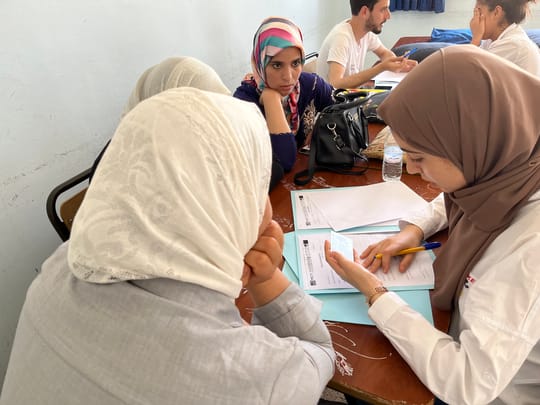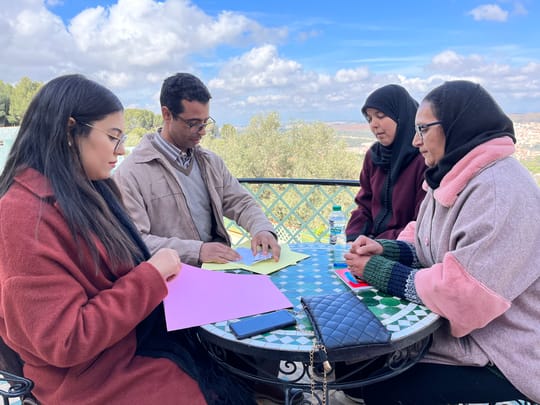Legal Aid with Moroccan Women: The Right Help at the Right Time

In September 2023, the government of Morocco, with the support of His Majesty King Mohammed VI, launched the reform of the Moudawana, the legal code governing women and family rights in Morocco. While this reform is expected to significantly improve the legal status of women and children, the challenge of access to justice still remains a big problem in Morocco.
Countless Moroccan women face cultural, economic, mobility, family, and educational barriers to completing administrative processes, understanding their rights and responsibilities as citizens, and participating in the legal process. Women need help now.
The High Atlas Foundation (HAF) has responded to the requests of local women by providing accessible, sound legal support to women through a public-private partnership launched this year with the University of Oujda. HAF is hosting a legal clinic for underserved women and at the same time is creating a cauldron of best practices for emerging law practitioners.
This legal clinic will be supported by the National Endowment for Democracy (NED) and comes following successful HAF legal clinics in Fez and Marrakech. The University of Oujda previously had a legal clinic that provides the foundation for HAF’s initiative. To ensure a deep reach into vulnerable and underserved communities, HAF is partnering with local CSOs to introduce the legal clinic into the eight provinces of Oujda and will even have mobile clinics heading into places where support is needed.

Consultation session between university students and a participants
Each of the HAF women's legal clinics in Morocco have been adapted to respond to the requests and needs of local and vulnerable communities. In 2019 in the heart of Fes, the partnership with Sidi Mohamed Ben Abdellah University marked the inception of HAF's first legal clinic model, with support from the NED and the Middle East Partnership Initiative (MEPI).
The clinic is still operational today and has trained hundreds of students and provided timely and helpful legal advice to over 300 individuals in need. Moreover, the clinic has forged strategic partnerships with universities, civil society organizations, and employment agencies, contributing to a vibrant ecosystem of community engagement and collaboration.
The second HAF legal clinic was created in Marrakech through a private-public partnership with Cadi Ayyad University and funded by the NED. The Marrakesh clinic extended the reach of traditional legal clinics to address pressing issues such as migration, family mediation, and human trafficking.
Through innovative approaches like mobile clinics and online counseling, the Marrakech clinic was able to serve over 300 individuals who were unable to seek aid in a central location. Additionally, the Marrakesh legal clinic conducted impactful training sessions focused on women's empowerment, contributing to personal and professional growth in the region for 160 women and 25 men. Training sessions and field trips included 67 university students and 45 associations.
"As a beneficiary of the training and accompaniment program, I am eternally grateful for the impact it has had on my professional development,” as mentioned by a participant in the HAF legal clinic in Fes. “The knowledge and skills I acquired through the program have been instrumental in my success, and the guidance and resources provided have been invaluable. I would wholeheartedly recommend this program to anyone seeking to advance their professional growth.”
HAF actively provides legal aid to communities because it is a core part of its participatory development approach. HAF has a diverse presence in Oujda including the Farmer to Farmer program, funded by the US Agency for International Development, and Towards Effective Development in the Eastern Region: Empowering Youth and Women Through Cooperatives program funded by MEPI.
In other parts of Morocco, HAF is empowering local communities to be frontline leaders in community development, women’s empowerment, multi-faith diversity, climate change mitigation, and water resources. By seeing community growth and prosperity as a common good to be envisioned, evaluated, and owned collectively, HAF facilitates conversations that evolve into the basis of trust for community-led project planning and success.
The impact of the HAF legal clinics extends beyond mere numbers, encapsulating stories of empowerment, resilience, and social change. By equipping students with practical legal skills, fostering partnerships with local stakeholders, and addressing the diverse needs of communities, HAF's legal clinics exemplify a holistic approach to community development. As these initiatives continue to evolve and expand, they serve as beacons of hope and progress, embodying the spirit of collaboration and social responsibility in Morocco's journey towards a more just and equitable society.